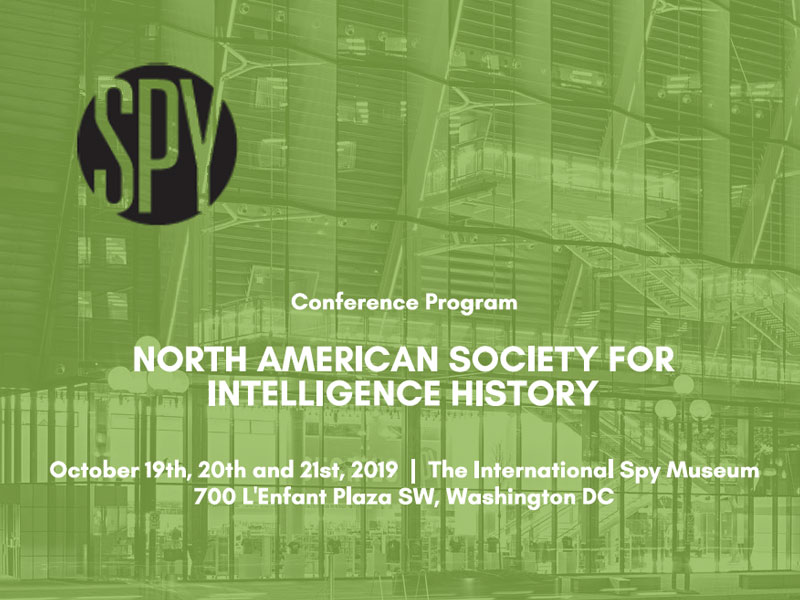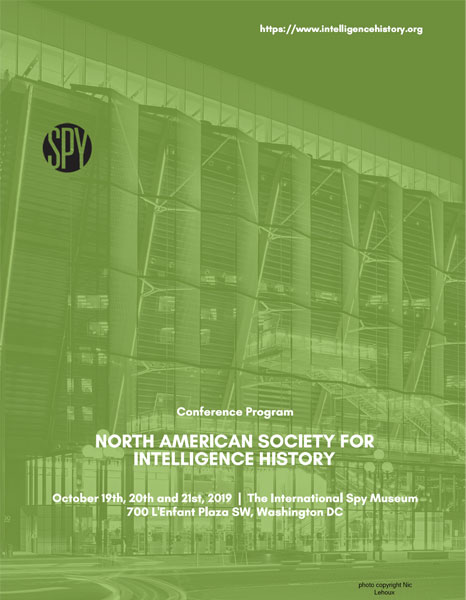
I will be the Discussant for a counterintelligence panel at the 2019 North American Society for Intelligence History conference which will be held at the International Spy Museum in Washington, DC on October 20-21, 2019.
The Panel 5A: Counterintelligence and Counterterrorism will be on Monday, October 21 from 11:00 am to 12:30 pm in the Temporary Exhibit Space at the museum. The panel membes and their speaking topics include:
- Tony Craig, Staffordshire University, “Operation Calaba: Sir Dick White, Intelligence, Enhanced Interrogation and the UK Government’s Role in Introducing Internment to Northern Ireland, 1971”
- Wesley Wark, University of Ottawa, “Canadian Counterintelligence Cases”
- John Fox, Federal Bureau of Investigation, “Gray Reflections from the Mirror: The Hanssen Case and American Counterintelligence”
David Robarge, historian at the Central Intelligence Agency, will be the chair of the panel.

The cost to attend the conference is $100; after October 1 it is $125 and onsite registration is $150. Students pay $50. Register here.
Conference Program (pdf)
Other panels at the two-day conference include:
Sunday, October 20, 2019
Panel #1: Spies and Espionage
10:30 AM – 12: 00 PM
Chair: Calder Walton, Harvard University
- Katherine Gruber, The Jamestown-Yorktown Foundation, “James Lafayette: Invisible Spy”
- Amanda Ohlke, International Spy Museum, “Ripe for Recruitment: Mata Hari as a Plausible Intelligence Asset”
- John Lisle, University of Texas, “Stealing Scientific Secrets: The Quest to Use Scientists as Spies Abroad”
- John Earl Haynes, independent scholar, and Harvey Klehr, Emory University, “Protecting FBI Informants: The Case of Morris and Jack Childs”
Discussant: Steve Usdin, Independent Scholar
PANEL 2: DISINFORMATION AND PSYCHOLOGICAL WARFARE
1:30 – 3:00 PM
Chair: Nicholas Dujmovic, Catholic University of America
- Ralph Sawyer, independent scholar, “ Disinformation Theory and Practice in Historic China”
- Mallory E. Needleman, American University, “Codename, Tirralira: The Story of the Lithuanian Émigré and HisTransformation from Nazi Collaborator, to Cold War-Era Informant for Western Intelligence Communities, to American Citizen”
- Thomas Boghardt, “The AIDS Disinformation Campaign: Soviet Active Measures and Lessons for Today”
- Gill Bennett, Royal United Services Institute, “ Counter-Disinformation and the Tools of the Intelligence Trade: An Historical Perspective”
Discussant: Ken Osgood, Colorado School of Mines
PANEL 2A: INTELLIGENCE ANALYSIS
1:30 – 3:00 PM
Chair: Sarah-Jane Corke, University of New Brunswick
- Mary Barton, Office of the Secretary of Defense, “Allies, Adversaries, and the Origins of Five Eyes”
- Michael Goodman, King’s College London, “Revelations from Britain’s Closed Intelligence Archives”
- Silke Zoller, Dartmouth College, “The CIA’s Conceptualization of ‘International Terrorism’ in the 1970s”
- Cynthia Storer, Johns Hopkins University, “Finding Bin Ladin: Intelligence Work Left of Boom”
Discussant: James Marchio, National Intelligence University
PANEL 3: INTELLIGENCE AND POPULAR CULTURE
4:00 – 5:30 PM
Chair: Jonna Mendez, CIA, retired
- Kathryn Olmsted, University of California, Davis, “Deep State Conspiracy Theories”
- Katherine Sibley, Saint Joseph’s University, “‘Her Position of Power Makes Her Gullibility the More Dangerous:’ Popular Perceptions of Eleanor Roosevelt’s Communist Ties during World War II”
- Jonathan Nashel, Indiana University, South Bend, “The Bonding of the CIA”
- Tricia Jenkins, Texas Christian University, “The CIA, Africa, and Black Panther: A ‘Marvelous’ Historical Reimagining”
Discussant: Stephen Marrin, James Madison University
PANEL 3A: SOVIET AND RUSSIAN INTELLIGENCE
4:00 – 5:30 PM
Chair: Mark Stout, Johns Hopkins University
- Emil Draitser, Hunter College, “Stalin’s Romeo Spy: Dmitri Bystrolyotov”
- Regina Kazyulina, Northeastern University, “Gender, Sexuality, and Soviet Intelligence Behind the Eastern Front”
- Kevin P. Riehle, National Intelligence University, “The Russian Soldier Fights on ‘Till Death: Soviet Intelligence and State Security Officers as German Prisoners of War”
- Filip Kovacevic, University of San Francisco, “The Shield, the Sword, and the Book: Publishing Books on Intelligence in Putin’s Russia”
Discussant: Mircea Munteanu, Office of the Historian, U.S. Department of State
Monday, October 21, 2019
PANEL 4: SIGNALS AND CYBER INTELLIGENCE
9:00 – 10:30 AM
Chair: Michael Warner, United States Cyber Command
- David Sherman, independent scholar, “The Making of a Codebreaker: The Case of Ann Caracristi”
- Sarah Mainwaring, Warwick University, “SIGINT: An Unlikely Marriage of Economics and Defence”
- David Schaefer, King’s College London, “Concealing Colossus: Signals Intelligence, Modern Computing, and British Secrecy in the 1970s”
- J.D. Work, Marine Corps University, “Of Stolen Silicon and COMBLOC Clones: Early Assessments of Proliferation in Weaponized Compute during the Cold War”
Discussant: John Ferris, University of Calgary
PANEL 4A: INTELLECTUAL AND CULTURAL APPROACHES TO INTELLIGENCE HISTORY
9:00 – 10:30 AM
Chair: Susan Perlman, National Intelligence University
- Ivan Greenberg, independent scholar, “Liberalism and Surveillance”
- Jonathan Edward Best, Queens’ University Belfast, “Britain’s Enemies during the Cold War: The British Spy Novel and British Intelligence, 1945-1964”
- Hugh Wilford, California State University, Long Beach, “Covert Empire: The CIA and the Third World in the Global Cold War”
- Charlotte Yelamos, King’s College London, “The Archaeology of Cold War Intelligence: Material and Landscape Studies of the BRIXMIS ‘Intelligence Culture’”
Discussant: Wesley Wark, University of Ottawa
PANEL 5: IMAGERY AND AERIAL RECONNAISSANCE
11:00 – 12:30 AM
Chair: Vincent Houghton, International Spy Museum
- James Green, NASA, “The Role of Civil War Balloons in Union Military Intelligence”
- Greg Elder, Orlando Pacheco, Defense Intelligence Agency, “DIA’s Untold Imagery Role in the Cuban Missile Crisis”
- Jack O’Connor, Johns Hopkins University, “ The Genesis of Geospatial Intelligence”
Discussant: Vincent Houghton, International Spy Museum
PANEL 5A: COUNTERINTELLIGENCE AND TERRORISM
11:00 – 12:30 AM
Chair: David Robarge, Central Intelligence Agency
- Tony Craig, Staffordshire University, “Operation Calaba: Sir Dick White, Intelligence, Enhanced Interrogation and the UK Government’s Role in Introducing Internment to Northern Ireland, 1971”
- Wesley Wark, University of Ottawa, “Canadian Counterintelligence Cases”
- John Fox, Federal Bureau of Investigation, “Gray Reflections from the Mirror: The Hanssen Case and American Counterintelligence”
Discussant: Raymond Batvinis, Independent Scholar
PANEL 6: COVERT OPERATIONS AND CLANDESTINE DIPLOMACY
2:30 – 4:00 PM
Chair: John Sano, Johns Hopkins University
- Rose Mary Sheldon, Virginia Military Institute, “Covert Action in the Early Roman Empire: Augustus and the Parthians”
- John Prados, National Security Archive, “Project MONGOOSE and After”
- Carl W. Forsberg, University of Texas at Austin, “Spies or Diplomats? Clandestine Channels in Henry Kissinger’s Shuttle Diplomacy”
- Cees Wiebes, University of Leiden, “Size Does Not Always Matter: The Joint Dutch-CIA Clandestine Rogue Operations in Rumania, 1948-1956”
Discussant: Magda Long, King’s College London
PANEL 6A: INTELLIGENCE IN WARTIME
2:30 – 4:00 PM
Chair: Alexis Albion, International Spy Museum
- Nicholas Reynolds, independent scholar, “The Unheralded Victory of the OSS XX System”
- Sara Bush Castro, United States Air Force Academy, “Nascent Norms for Covert Action: U.S. Intelligence Operations in Communist-held China during World War II”
- Travis Weinger, King’s College London, “Intelligence Failure and the Third Anglo-Afghan War”
- Mary Kathryn Barbier, Mississippi State University, “Too Great a Risk to Obtain Possible Actionable Intelligence? The Wartime Images of Spy and Double Agent Lily Sergueiew”
Discussant: Greg Elder, Defense Intelligence Agency
You must be logged in to post a comment.